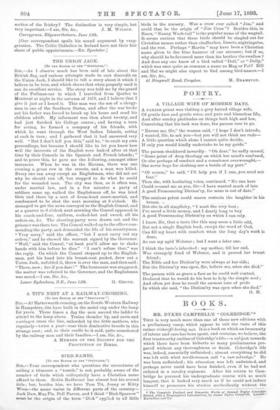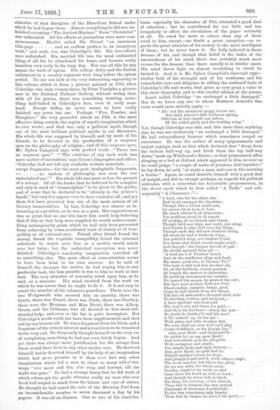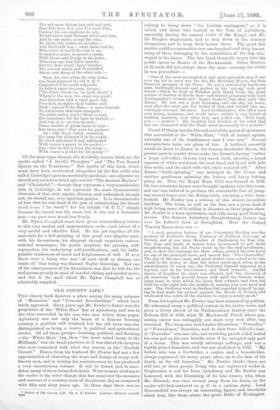BOOKS.
MR. DYKES CAMPBELL'S " COLE RID GE." *
THIS is very much more than one of those new editions with a preliminary essay, which appear to suit the taste of this rather 9.6am/ft-loving age. It is a book on which an immensity of labour and care has been spent, and contains, we believe, the first trustworthy outline of Coleridge's life,—a subject towards which there have been hitherto so many preliminaries pre- pared without any thoroughness or finish. Coleridge's life was, indeed, essentially unfinished ; almost everything he did was left with what needlewomen call "a raw selvedge." He was born unfinished ; his education was left unfinished, and perhaps never could have been finished, even if he bad not enlisted in a cavalry regiment. After his return to Cam- bridge he pursued his undergraduate course with so much languor, that it looked very much as if be could not induce himself to prosecute his studies methodically without the • Ths Complete Poetioal and Dramatic Works of Samuel Taylor Coleridge. Edited, with a Biographical Introduction, by James Dykes Campbell. London :. Mac:nil/an and Co. stimulus of that discipline of the Blue.Coat School under which he bad begun them. Almost everything he did was un- finished excepting " The Ancient Mariner." Even " Obristabel" Was unfinished. All his efforts at journalism were mere com- mencements. Hazlitt called The Friend " an enormous
title-page and an endless preface to an imaginary work," and such, too, was Coleridge's life. His love-affairs were unfinished. His married life was the most unfinished thing of all, for he abandoned his home, and became really homeless very early in the long day. Nor was all this by any means the work of opium. His college debts and the foolish enlistment in a cavalry regiment were long before the opium period. No one can look at the very interesting engraving to this volume, which is from a picture painted in 1795, when Coleridge was only twenty-three, by Peter Vandyke, a picture now in the National Portrait Gallery, without seeing that, with all his genius, there was something wanting, some- thing half-baked in Coleridge's face, even in early man- hood. Except trifles, he never seems to have really finished any poem but one. Perhaps "Fire, Famine, and Slaughter," the very powerful attack on Pitt, is the most effective thing outside the region of mystic imagination which he ever wrote; and that was only a political squib, though one of the most brilliant political squibs in our literature. His whole life was supposed by himself, and by most of his friends, to be devoted to the production of a magnum opus on the philosophy of religion ; and of this magnum, opus, Mr. Dykes Campbell says with perfect truth : "There was no magnum opus." " The existence of any such work was mere matter of moonshine,' says Green's biographer and editor Coleridge had not left any available written materials except fragments,—for the most part inadaptable fragments,
no system of philosophy, nor even the raw materials of one." His whole life was more or less the pursuit of a mirage. Of all the books that he believed to be complete and only in need of "transcription" to be given to the public, and of some that he declared to be " already in the printer's hands," but very few appear ever to have existed at all ; and yet these few have procured him one of the most certain of all literary immortalities. In fact, Coleridge was almost as in- teresting as a problem, as be was as a poet. His suggestiveness was so great that no one who knew him could help believing that if this or that help were supplied, he would achieve some- thing unimaginably great, which he bad only been prevented from achieving by some accidental want of money or of tran- quillity or of external care. Friend after friend found the money, found the requisite tranquillity, found the external solicitude to watch over him as a mother would watch over her baby ; but the unfinished conception was never finished. Coleridge's wandering imagination travelled off to something else. The mere effort at concentration seems to have been fatal to its own success. As he said of himself, the stronger the motive he had urging him to any particular task, the less possible it was to him to work at that task. The very stimulus of necessity acted upon him, as he said, as a narcotic. His mind recoiled from the work on which he was aware that he ought to fix it. It is not easy to count the number of his volunteer guardians. There were the two Wedgwoods who secured him an annuity, there was Cottle, there was Stuart, there was Poole, there was Southey, there were the Morgans and Miss Brent, there was Allsop, Green, and the Gillmans, who all devoted to him most sub- stantial help ; and even so the list is quite incomplete. But Coleridge's needs could not have been supplemented and eked out by any human aid. He was a fragment from his birth, and a fragment of the utmost interest and attractiveness he remained to the very end. He frequently thought himself on the very eve of completing something he had not even fairly begun. And yet there was always more justification for the mirage than there would have been in any other similar case. He deceived himself, but he deceived himself by the help of an imagination which had more promise in it than ever had any other imagination which led a man to chase so many will-o'-the- wisps " o'er moor and fen, o'er crag and torrent, till the night was gone." He bad a strange fancy that he did work of which others got the profit, whereas really no man who ever lived had reaped so much from the labour and care of others. He thought he had raised the sale of the Morning Post from an inconsiderable number to seven thousand a day by his papers. It was all an illusion. One or two of his contribu- tions, especially his character of Pitt, attracted 'a good deal of attention ; but he contributed far too little and too irregularly to affect the circulation of the paper seriously at all. He owed far more to others than any of them. owed to him, except,—no doubt a great exception,—as re- gards the great stimulus of his society to the more intelligent of them ; but he never knew it. He fully believed in these- dreams of his, and though that belief is the index of the unsoundness of his mind, there was certainly much more excuse for the dreams than there usually is in similar cases. His mind threw light on almost everything to which he turned it. And it is Mr. Dykes Campbell's thorough appre- ciation both of his strength and of his weakness, and his. remarkable care and diligence in sifting the confused facts of Coleridge's life and works, that gives so very great a value to this short biography, and to this careful edition of the poems.
Lamb called Coleridge "an archangel a little damaged." Nor do we know any one to whom Matthew Arnold's fine verse would more strictly apply :-
" Ah I not the nectarous poppy lovers use,
Not daily labour's dull Lethaian spring, Oblivion in lost angels can infuse, Of the soiled glory and the trailing wing."
Yet, though Coleridge was this, and this more than anything- else, he was not exclusively "an archangel a little damaged." He had extraordinary humour which sometimes verged on coarseness. He was the author of many epigrammatic and unjust sayings, such as that which declared that " dregs from the bottom half-way up, and froth from the top half-way down," made up Whitbread's Entire ; or that pronounced, after sleeping on a bed at Oxford, which appeared to him, as near as he could judge, "a couple of sacks of potatoes tied together ;" he lay down, he said," at night a man, and rose in the morning a bruise." Again, he could describe himself with a good deal of insight, and did so, though perhaps, as regards his political attitudes, with a somewhat too favourable prepossession, in the clever squib which he first called " A. Trifle " and sub- sequently "A Character : "—
" A bird, who for his other sins Had lived amongst the Jacobins;
Though like a kitten amid rats, Or callow tit in nest of bats, He much abhored all democrats; Yet nathless stood in ill report Of wishing ill to Church and Court, Though he'd nor claw, nor tooth, nor sting,
And learnt to pipe God save the King ;
Though each day did new feathers bring,
All swore he bad a leathern wing;
Nor polish'd wing, nor feather'd tail, Nor down-clad thigh would aught avail;
And though—his tongue devoid of gall—
He civilly assured them all :- ' A bird am I of Phoebus' breed, And on the sunflower cling and feed; My name, good sirs, is Thomas Tit I' The bats would hail him brother cit, Or, at the furthest, cousin-german.
At length the matter to determine, He publicly denounced the vermin ; He spared the mouse, he praised the owl; But bats were neither flesh nor fowl.
Blood-sucker, vampire, harpy, goul, Came in full clatter from his throat,
Till his Pld nest-mates changed their note-
To hireling, traitor, and turncoat,— A base apostate who had sold His very teth and claws for gold;
And then his foal hers I—sharp the jest—
No doubt he feather'd well his nest!
A Tit indeed! ay, tit for tat—
With place and title, brother Bat, We soon shall see how well he'll play
Count Goldfinch, or Sir Joseph Tay 1'
Alas, poor Bird! and ill.bestared- Or rather let us say, poor Bard I And henceforth quit the allegoric, With metaphor and simile, For simple facts and style historic :- Alas, poor Bard! no gold had he. Behind another's team he stopt,
And plough'd and sow'd, while others reapt;
The work was his, but theirs the glory,
bic vos non vobis, his whole story.
Besides, whate'er he wrote or said Came from his heart as well as head ; And though he never loft in lurch His king, his country, or his church, 'Twas but to humour his own cynical Contempt of doctrines Jacobinical; To his own conscience only hearty, 'Twas but by chance he served the party ;—
The self-same things had said and writ, Had Pitt been Fox, and Fox been Pitt ; Content his own applause to win, Would never dash through thick and thin, And he can make, so say the wise, No claim who makes no sacrifice ;— And Bard still less :—what claim had he, Who swore it vex'd his soul to see So grand a cause, so proud a realm, With Goose and Goody at the helm ; Who long ago had fall'n asunder But for their rivals' baser blunder, The coward whine and Frenchified Slaver and slang of the other side !-
Thus, his own whim his only bribe, Our bard pursued his old A. 13. C.
Contented if he could subscribe In fullest sense his name "Errrmr€; ('Tie Punic Greek for 'he hath stood ! ') Whate'er the men, the cause was good ; And therefore with a right good will, Poor fool, ho fights their battles still. Tash squeak'd the Bats ;—a mere bravado To whitewash that base renegade ; 'Tis plain unless you're blind or mad, His conscience for the bays he barters ;-
And true it is—as true as sad— These circlets of green baize he had—
But then, alas! they were his garters Ala silly Bard, tided, untended, His lamp but glimmer'd in its socket ; He lived unhonour'd and unfriended With scarce a penny in his pocket ;—
Nay—tho' he hid it from the many—
With scarce a pocket for his penny !"
Of the same type, though of a decidedly coarser kind, are the squibs called " A Devil's Thoughts " and " The Two Round Spaces on the Tombstone." But squibs of this kind, which must have been overlooked altogether by the fine critic who called Coleridge's genius essentially spiritual,—an adjective we should not ourselves think apt even for "The Ancient Mariner" and " Christabel,"—though they represent a very considerable vein in Coleridge, do not represent the most characteristic elements of that rich, mystic, dreamy, and unfinished, though not, we should say, very spiritual genius. It is characteristic of him that he was fond of the pun of substituting the Greek word Varaas (" he stood") for his initials " S. T. C.," simply because the sound was the same, but it was not a fortunate pun ;—no poet ever stood less firmly.
Mr. Dykes Campbell must have given extraordinary labour to this very modest and unpretentious work,—and labour of a
very useful and effective kind. He has got together all the materials for a full painting of this great and singular poet, with his dreaminess, his eloquent though vagarious conver- sational monologue, his gentle laughter, his piercing self- reproaches, his underlying self-justifications, and his indis- putable tenderness of heart and helplessness of will. If ever there were a being who was "of such stuff as dreams are made of," that being was Samuel Taylor Coleridge. But one of the consequences of his dreaminess was that he left his life and poems greatly in need of careful editing and careful notes, and this is the need which Mr. Dykes Campbell has so admirably supplied.




































 Previous page
Previous page